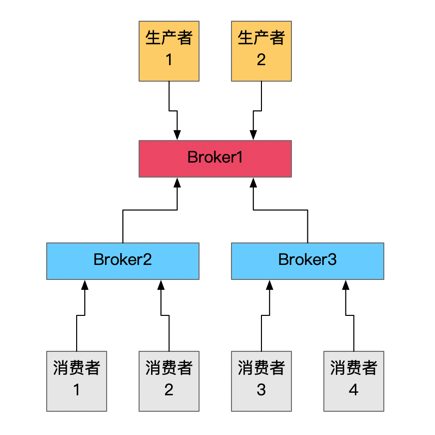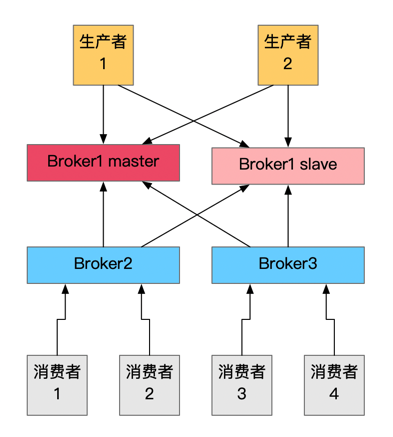ActiveMQ 常见集群模式
Master Slave 架构模式
这种模式是基于文件共享锁的高可用集群,个人理解其实是一种 Failover 模式,可以是一主一从,也可以是一主两从。
本文使用 Docker 搭建一个主从模式的 ActiveMQ 5.8.0 集群,一个主节点,两个从节点。
ActiveMQ 镜像的创建可以参考 构建ActiveMQ镜像并运行
version: "2.1"
services:
activemq-A:
image: cocowool/activemq:5.8.0
hostname: activemq-A
expose:
- "8161"
- "61613"
ports:
- "8161:8161"
- "61613:61613"
volumes:
- ~/Projects/sh-valley/docker-conf/activemq/activemq-5.8.0-A.xml:/usr/local/apache-activemq-5.8.0/conf/activemq.xml
- ~/Projects/sh-valley/docker-conf/activemq/kahadb:/usr/local/apache-activemq-5.8.0/data/kahadb
networks:
- default
activemq-B:
image: cocowool/activemq:5.8.0
hostname: activemq-B
expose:
- "8162"
- "61614"
ports:
- "8162:8161"
- "61614:61613"
volumes:
- ~/Projects/sh-valley/docker-conf/activemq/activemq-5.8.0-B.xml:/usr/local/apache-activemq-5.8.0/conf/activemq.xml
- ~/Projects/sh-valley/docker-conf/activemq/kahadb:/usr/local/apache-activemq-5.8.0/data/kahadb
networks:
- default
其实两个配置文件是一样的,关键是将 kahadb 的目录利用本地文件实现在两个容器见共享。验证过程记录。
$ docker-compose up
Attaching to activemq_activemq-B_1, activemq_activemq-A_1
activemq-B_1 | INFO: Using default configuration
activemq-B_1 | (you can configure options in one of these file: /etc/default/activemq /root/.activemqrc)
activemq-B_1 |
activemq-B_1 | INFO: Invoke the following command to create a configuration file
activemq-B_1 | /usr/local/apache-activemq-5.8.0/bin/activemq setup [ /etc/default/activemq | /root/.activemqrc ]
activemq-B_1 |
activemq-A_1 | INFO: Using default configuration
activemq-A_1 | (you can configure options in one of these file: /etc/default/activemq /root/.activemqrc)
activemq-A_1 |
activemq-A_1 | INFO: Invoke the following command to create a configuration file
activemq-B_1 | INFO: Using java '/usr/local/jdk1.8.0_144/bin/java'
activemq-A_1 | /usr/local/apache-activemq-5.8.0/bin/activemq setup [ /etc/default/activemq | /root/.activemqrc ]
activemq-A_1 |
activemq-B_1 | INFO: Starting in foreground, this is just for debugging purposes (stop process by pressing CTRL+C)
activemq-A_1 | INFO: Using java '/usr/local/jdk1.8.0_144/bin/java'
activemq-A_1 | INFO: Starting in foreground, this is just for debugging purposes (stop process by pressing CTRL+C)
activemq-B_1 | Java Runtime: Oracle Corporation 1.8.0_144 /usr/local/jdk1.8.0_144/jre
activemq-B_1 | Heap sizes: current=1005056k free=989327k max=1005056k
activemq-B_1 | JVM args: -Xms1G -Xmx1G -Djava.util.logging.config.file=logging.properties -Dcom.sun.management.jmxremote -Djava.io.tmpdir=/usr/local/apache-activemq-5.8.0/tmp -Dactivemq.classpath=/usr/local/apache-activemq-5.8.0/conf; -Dactivemq.home=/usr/local/apache-activemq-5.8.0 -Dactivemq.base=/usr/local/apache-activemq-5.8.0 -Dactivemq.conf=/usr/local/apache-activemq-5.8.0/conf -Dactivemq.data=/usr/local/apache-activemq-5.8.0/data
activemq-B_1 | Extensions classpath:
activemq-B_1 | [/usr/local/apache-activemq-5.8.0/lib,/usr/local/apache-activemq-5.8.0/lib/camel,/usr/local/apache-activemq-5.8.0/lib/optional,/usr/local/apache-activemq-5.8.0/lib/web,/usr/local/apache-activemq-5.8.0/lib/extra]
activemq-B_1 | ACTIVEMQ_HOME: /usr/local/apache-activemq-5.8.0
activemq-B_1 | ACTIVEMQ_BASE: /usr/local/apache-activemq-5.8.0
activemq-B_1 | ACTIVEMQ_CONF: /usr/local/apache-activemq-5.8.0/conf
activemq-B_1 | ACTIVEMQ_DATA: /usr/local/apache-activemq-5.8.0/data
activemq-A_1 | Java Runtime: Oracle Corporation 1.8.0_144 /usr/local/jdk1.8.0_144/jre
activemq-A_1 | Heap sizes: current=1005056k free=989327k max=1005056k
activemq-A_1 | JVM args: -Xms1G -Xmx1G -Djava.util.logging.config.file=logging.properties -Dcom.sun.management.jmxremote -Djava.io.tmpdir=/usr/local/apache-activemq-5.8.0/tmp -Dactivemq.classpath=/usr/local/apache-activemq-5.8.0/conf; -Dactivemq.home=/usr/local/apache-activemq-5.8.0 -Dactivemq.base=/usr/local/apache-activemq-5.8.0 -Dactivemq.conf=/usr/local/apache-activemq-5.8.0/conf -Dactivemq.data=/usr/local/apache-activemq-5.8.0/data
activemq-A_1 | Extensions classpath:
activemq-A_1 | [/usr/local/apache-activemq-5.8.0/lib,/usr/local/apache-activemq-5.8.0/lib/camel,/usr/local/apache-activemq-5.8.0/lib/optional,/usr/local/apache-activemq-5.8.0/lib/web,/usr/local/apache-activemq-5.8.0/lib/extra]
activemq-A_1 | ACTIVEMQ_HOME: /usr/local/apache-activemq-5.8.0
activemq-A_1 | ACTIVEMQ_BASE: /usr/local/apache-activemq-5.8.0
activemq-A_1 | ACTIVEMQ_CONF: /usr/local/apache-activemq-5.8.0/conf
activemq-A_1 | ACTIVEMQ_DATA: /usr/local/apache-activemq-5.8.0/data
activemq-B_1 | Loading message broker from: xbean:activemq.xml
activemq-A_1 | Loading message broker from: xbean:activemq.xml
activemq-B_1 | INFO | Refreshing org.apache.activemq.xbean.XBeanBrokerFactory$1@68c4039c: startup date [Wed Sep 07 13:16:20 UTC 2022]; root of context hierarchy
activemq-A_1 | INFO | Refreshing org.apache.activemq.xbean.XBeanBrokerFactory$1@68c4039c: startup date [Wed Sep 07 13:16:20 UTC 2022]; root of context hierarchy
activemq-B_1 | INFO | PListStore:[/usr/local/apache-activemq-5.8.0/data/localhost/tmp_storage] started
activemq-B_1 | INFO | Using Persistence Adapter: KahaDBPersistenceAdapter[/usr/local/apache-activemq-5.8.0/data/kahadb]
activemq-A_1 | INFO | PListStore:[/usr/local/apache-activemq-5.8.0/data/localhost/tmp_storage] started
activemq-A_1 | INFO | Using Persistence Adapter: KahaDBPersistenceAdapter[/usr/local/apache-activemq-5.8.0/data/kahadb]
activemq-A_1 | INFO | Database /usr/local/apache-activemq-5.8.0/data/kahadb/lock is locked... waiting 10 seconds for the database to be unlocked. Reason: java.io.IOException: File '/usr/local/apache-activemq-5.8.0/data/kahadb/lock' could not be locked.
activemq-B_1 | INFO | KahaDB is version 4
activemq-B_1 | INFO | Recovering from the journal ...
activemq-B_1 | INFO | Recovery replayed 1 operations from the journal in 0.022 seconds.
activemq-B_1 | INFO | Apache ActiveMQ 5.8.0 (localhost, ID:activemq-B-41795-1662556582026-0:1) is starting
activemq-B_1 | INFO | Listening for connections at: tcp://activemq-B:61616?maximumConnections=1000&wireformat.maxFrameSize=104857600
activemq-B_1 | INFO | Connector openwire Started
activemq-B_1 | INFO | Listening for connections at: amqp://activemq-B:5672?maximumConnections=1000&wireformat.maxFrameSize=104857600
activemq-B_1 | INFO | Connector amqp Started
activemq-B_1 | INFO | Listening for connections at: stomp://activemq-B:61612?transport.closeAsync=false
activemq-B_1 | INFO | Connector stomp Started
activemq-B_1 | INFO | Listening for connections at: stomp+nio://activemq-B:61613?transport.closeAsync=false
activemq-B_1 | INFO | Connector stomp+nio Started
activemq-B_1 | INFO | Apache ActiveMQ 5.8.0 (localhost, ID:activemq-B-41795-1662556582026-0:1) started
activemq-B_1 | INFO | For help or more information please see: http://activemq.apache.org
activemq-B_1 | ERROR | Temporary Store limit is 51200 mb, whilst the temporary data directory: /usr/local/apache-activemq-5.8.0/data/localhost/tmp_storage only has 42398 mb of usable space
activemq-B_1 | INFO | Web console type: embedded
activemq-B_1 | INFO | ActiveMQ WebConsole initialized.
activemq-B_1 | INFO | Initializing Spring FrameworkServlet 'dispatcher'
activemq-B_1 | INFO | jolokia-agent: No access restrictor found at classpath:/jolokia-access.xml, access to all MBeans is allowed
activemq-A_1 | INFO | Database /usr/local/apache-activemq-5.8.0/data/kahadb/lock is locked... waiting 10 seconds for the database to be unlocked. Reason: java.io.IOException: File '/usr/local/apache-activemq-5.8.0/data/kahadb/lock' could not be locked.
根据启动的顺序不同,A、B 都有可能抢到锁对外提供服务,未抢到锁的实例日志一直会报无法解锁的错误,同时不会对外提供 Web Console 服务。使用 Python 的连接例子,发现 stomp.py 有一个问题不能很好的支持 failover。
Networks of Brokers
这是一种负载均衡的架构,各个 Broker 通过互相连接并共享队列信息,实现集群的负载均衡,即只要消费者连接到 Broker 网络中任意一台,就可以消费所有的消息。
这种方案主要关注 ActiveMQ 配置中的两个参数
- TransportConnector,传输连接器参数主要控制服务端和客户端之间的通信方式
- NetworkConnector,网络连接器参数主要控制服务端和服务端之间的通信
本文构建了这样一种架构,Broker1 作为与生产者沟通的节点,负责接收消息以及传递消费者反馈给生产者的消息,Broker2、Broker3作为与消费者沟通的节点,支持与大量的消费者建立链接。这种架构适用于消费者数量非常多,通常是超过1万个节点的情况。根据实际生产运行的情况,一台4C16G的虚拟机,一个ActiveMQ实例通常能够承受2000个左右的链接能保持长期稳定运行。

具体的 docker 配置如下,相关的文件可以从我的 Github 上下载。
version: "2.1"
services:
activemq-broker1:
image: cocowool/activemq:5.8.0
hostname: activemq-broker1
expose:
- "8161"
- "61611"
ports:
- "8161:8161"
- "61611:61612"
volumes:
- ~/Projects/sh-valley/docker-conf/activemq-network/activemq-5.8.0-broker1.xml:/usr/local/apache-activemq-5.8.0/conf/activemq.xml
networks:
activemq-network:
ipv4_address: 172.28.1.11
activemq-broker2:
image: cocowool/activemq:5.8.0
hostname: activemq-broker2
expose:
- "8162"
- "61612"
ports:
- "8162:8161"
- "61612:61612"
volumes:
- ~/Projects/sh-valley/docker-conf/activemq-network/activemq-5.8.0-broker2.xml:/usr/local/apache-activemq-5.8.0/conf/activemq.xml
networks:
activemq-network:
ipv4_address: 172.28.1.12
activemq-broker3:
image: cocowool/activemq:5.8.0
hostname: activemq-broker3
expose:
- "8163"
- "61613"
ports:
- "8163:8161"
- "61613:61612"
volumes:
- ~/Projects/sh-valley/docker-conf/activemq-network/activemq-5.8.0-broker3.xml:/usr/local/apache-activemq-5.8.0/conf/activemq.xml
networks:
activemq-network:
ipv4_address: 172.28.1.13
networks:
activemq-network:
ipam:
config:
- subnet: 172.28.1.0/24
执行 docker-compose up 命令可以启动三个 ActiveMQ 实例,然后分别通过 http://localhost:8161\8162\8163 可以查看三个实例的控制台,在 Broker2\Broker3 的 Network 页签下可以看到到 Broker1 的链接。我们在生产实践过程中发现过这个连接出问题的情况,此时 ActiveMQ 实例进程并无异常,这时就会影响连接到这个实例的消费者。

要测试这种架构的可用性,可以参考 Python 与 ActiveMQ 交互的一些例子 中的代码示例,修改对应的端口地址就能看到效果。
这个架构可以配合 Master Slave 进一步优化,如下图所示:

生产者连接的实例采用 Master Slave Failover 方式,消费者连接的实例在配置 NetworkConnector 时也采用 Failover 模式,这样 Broker1 就提供了主从的高可用模式,进一步提高了整个集群应对风险的能力。


 浙公网安备 33010602011771号
浙公网安备 33010602011771号